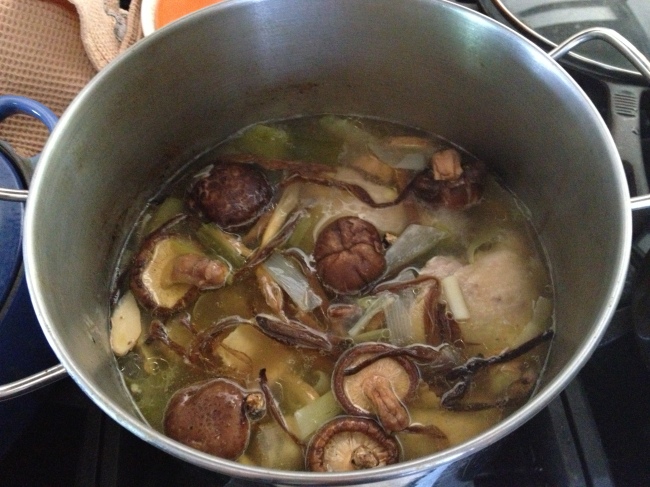The amount of energy invested during pregnancy, labor and birth can leave the body exhausted of vital substances. Age, constitution, preconception health, and the care the mother receives post-delivery will determine how her body will fare/recover in the months that follow.
Postpartum care in certain cultures is known as the confinement period and involves sufficient rest combined with warm nourishing meals. Chicken broth, prepared by simmering the bones, muscle and fat of chicken meat for several hours in water to release minerals and amino acids, is traditionally used in Chinese cooking as one means of replenishing the energy and fluids lost. This medicinal soup also supports the production of breast milk.
- These are used frequently in Chinese cooking like stir-fries, soups, and stews. Similar to ginseng which flourishes in the most dismal environments, wood ears grow on dead tree trunks. They thrive in bleak conditions because they carry within them inherent energy and nutrition. According to Chinese nutritional principles, wood ears promote the health of the spleen and stomach system which is responsible for our daily energy levels. Wood ears are also thought to clean the blood of impurities. They are a good source for vitamins, minerals, like calcium and iron, fiber and amino acids. They also contain vitamin B1 and B2 and lecithin.
- Lily bulbs are a slightly sweet tasting Chinese herb which supply proteins, starches and small amounts of calcium, iron, phosphorus, and vitamins B1, B2 and C. Lilly bulbs moisten the lungs and can relieve heat symptoms such as dry throat. They benefit the nervous system and calm heart palpitations, irritability or insomnia.
- Garlic is traditionally used as a galactagogue (something that induces milk production). Garlic may not agree with your baby so introduce it slowly.
- Red dates are an excellent source of vitamins C and can strengthen immune function. They also contain iron and benefit women who tend towards iron deficiency anemia. From a traditional Chinese medicine standpoint, red dates nourish blood by strengthening the digestive system. They warm the body and, like the lily buds, calm the heart when there is insomnia or anxiousness. Because of their high nutritional value, red dates are good to consume during recovery from illness or if one is feeling generally weak. In addition, they’re recognized as an anti-aging food and women traditionally consume a couple a day to keep their youth and beauty:)
- Leeks can strengthen the yang or warming energy of the body. The amount of fluids and energy lost during pregnancy and birth drain and deplete creating cold sensations. Warm foods are necessary to support basic metabolic functions.
- Warming and pungent. Great for feelings of cold and improving circulation.
- Consume enough nutrient-dense foods throughout the day. This could be organic eggs or meat, grains like rice or quinoa, legumes, starchy vegetables like carrots, beets, fennel, any of the green vegetables, and healthy fats like avocado and nuts. Sufficient caloric intake will support milk production. Aim for four to five warm or room temperature meals per day.
- Breast milk depends on the the amount of fluid in the body. Hydrate well.
- Season food with sea-salt, black sesame seeds, anti-oxidant rich spices like dill or caraway, basil and marjoram, and, if tolerated, garlic.
- Exercise moderately. Movement is important to prevent energy from getting stuck and causing emotional imbalances.
- Avoid food that makes the digestive system work harder such as fried or extremely fatty food.
- Avoid chronic exposure to cold environments.
Most importantly, check in with yourself and listen to what your body is telling you. Give yourself and your newborn enough time to settle in.
Carla Vidor, L.Ac., D.A.O.M., FABORM

NOV

